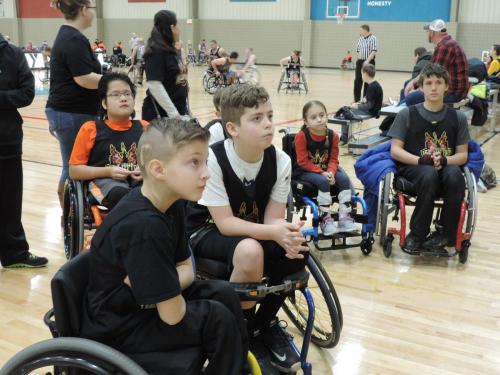
In early January right after college holidays concluded I left with the University of Arizona Women’s Wheelchair Basketball Team for Wichita, Kansas. We were attending the Wichita Bash which included all of the college men (10 teams) and women’s (5 teams) wheelchair basketball teams. The event was sanctioned by the National Wheelchair Basketball Association making it very important that things ran smoothly. Although not getting much exposure as compared with able bodied college basketball, the Bash was a who’s who of wheelchair basketball players and coaches including those of the gold medal women (Stephanie Wheeler-University of Illinois) and men’s (Ron Lykins-University of Missouri) US teams at the Rio Paralympics. The event was organized by Rob Egan and the NGO which he founded the American Collegiate Society for Adapted Athletics (ACSAA).
Rob was born in 1995 and at the age of two he was diagnosed with cerebral palsy. At the age of 14, when Rob was in the 8th grade he participated in a 100 word essay contest with the topic, “how to change the world”. The winner would get $1000 which would be put into a college account. Rob wasn’t quite sure what to write about but he started having dreams about how to have more athletic competitions for people with disabilities who were attending college. Although Rob didn’t win the contest, his dreams continued and in mid-2009 he founded ACSAA.
ACSAA exists to provide an opportunity for students with disabilities to compete in multiple sports through university sponsored programs. (In trying to find information for this article regarding college adaptive sports programs I could only find 21).
The cornerstone goals of ACSAA are:
1. Promote and support existing adapted athletics programs;
2. Assist in the organization, promotion, and support of existing intercollegiate adapted athletics competitions;
3. Create, organize, promote, and support new adapted athletics programs and intercollegiate competitions.
In order to put the third edition of the Bash together, ACSAA had multiple partners, including the Hyatt Hotel in Wichita, which has kept room rates low, the YMCA in Andover which provided the courts at no cost, some private family foundations and numerous volunteers. Rob’s family members including his mom and dad and one of his brothers also provided tremendous support.
But the tournament was not only about college students. I also met Grant Pierce and his mom Kary as well as another mom Leann Funk. Grant seems like any other 11 year old. He wants to be a mechanical engineer and design phones for Apple. He loves sports and participates as much as possible in track and field. However he also has a rare disease called Bockenheimer's Syndrome which leaves him walking with a cane or rolling in a wheelchair. Although Wichita boasts a population of close to 400,000, both Kerry and Leann found that there weren’t enough activities for children with disabilities. They took it upon themselves to form a junior wheelchair basketball team, the Wildfire. The goal is to have a year round sports club. The Wildfire team members attended the Bash in order to meet with a number of the coaches and players gaining valuable inspiration for making their team a success.
When I came back to the US in September 2016, I knew that things would be different for people with disabilities, however there are still huge gaps. Rob and ACSAA feel that public-private partnerships might hold the key for providing more program funding, expansion and sustainability of adaptive athletics. He has asked the Kansas State Legislature to provide some funding for college adapted sports programs. Using a public-private model would mean that corporations, foundations and/or individuals would also need to provide matching funds.
Rob Egan is only 21 years old and other members of his board including his board vice president Connor England are also very young. But age doesn’t seem to matter when there are dreams and persistence to fulfill these. While living in Nepal, I met numerous young people including those with disability who also have dreams. ACSAA wants all people to be treated equally. The US and Nepal may be half a world away, but what it takes is an enabling environment to make people’s dreams come true and change society for the better.










Add new comment